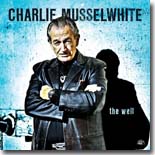|
Charlie Musselwhite
The Well
Alligator Records
|

Come experience the blues dripping off reeds.
With The Well, Charlie Musselwhite’s
return to Alligator Records -- where he
recorded three successful albums in the early 1990s
-- is his first recording where he wrote every track
on the album. In addition to re-establishing himself
on Alligator, the harmonica master, vocalist,
songwriter, and guitarist also reconstructs himself
as a traditional blues artist on The Well.
The music here is quite different from the
contemporary sounds he produced on his two previous
discs on RealWorld Records.
Yes, those trademark spoken-like vocals of
Musselwhite’s abound on this 48-minute disc. You
will also hear his Deep South influences (especially
in his traditional acoustic guitar), probing and
jazz-influenced harmonica, and overall laid-back
sensibility. The band was brought together by
producer Chris Goldsmith. The Well was
recorded in Los Angeles with guitarist Dave Gonzales
(Paladins, Hacienda Brothers), bassist John Bazz
(The Blasters), and drummer Stephen Hodges (Tom
Waits, Mavis Staples).
“Rambler’s Blues” kicks things off. Melodically it
sounds like Muddy Waters’ “You Need Love.” However,
the exclusive lyrics reveal Musselwhite’s passion to
roam and ramble. The title track sounds like it
could have come from the Delta Hardware
recording sessions, but the song evolved naturally
during the sessions for The Well. It’s a
rockin’ number with a sound that is a throwback to
the ’50s. The song reveals the inspiration which
provided Musselwhite the courage to be brave and
face his alcohol addiction.
In December 2005, Musselwhite’s mother was murdered
in her Memphis home. “Sad and Beautiful World” comes
from the things he wanted to say after that tragic
event. The highly-emotional song mixes a very sweet
melody with tragic lyrics. The harp shares the
anguish of the lyrics. With special guest and
longtime friend, Mavis Staples, Charlie sings the
tragic yet uplifting words, “Blues heal what’s been
torn apart/Let the river heal my heart.”
"Hoodoo Queen" sounds mysterious and spooky. It
reveals the harp blower’s fascination with Marie
Laveau, the Hoodoo Queen. Like a good novel, this
song takes some time, three minutes in particular,
to develop. “Cook County Blues” features southern
country-styled fast finger guitar picking, which is
ironic given the song, is about being arrested in
the northern city of Chicago.
With a full and big sounding guitar, rich harp, and
thumping upright bass, “Dig The Pain” demonstrates
the sound of West Coast jump/swing music. You also
hear that sound, which combines ’50s Chicago blues
with post-War Texas blues on the instrumental “Sonny
Payne Special.” “Just You, Just Blues” contains one
of those ultra-catchy grooves that naturally gets
imbedded in your memory. Musselwhite has created
such grooves time again throughout his almost
50-year career, most recently on “Church Is Out”
from Delta Hardware. This song isn’t as
rocking as church but the potent rhythm, masterful
guitar, and soaring harp are the best the CD has to
offer.
Throughout, the harp skitters with emotion.
Musselwhite plays his sensational mouth organ like a
freewheeling piano man barreling up and down the
88s, and he possesses the innate ability to use his
wistful Mississippi saxophone to carry your troubles
away like a brisk wind. As a bonus, Musselwhite
performs guitar on a couple tracks which sound like
they came straight from the front porch of a
Mississippi tin shack.
With 30 solo albums to his credit, Musselwhite has
also appeared on numerous recordings as a featured
player with Tom Waits, Eddie Vedder, Ben Harper,
John Lee Hooker, Bonnie Raitt, Blind Boys Of
Alabama, INXS, and most recently, Cyndi Lauper. He
was inducted into the Blues Foundation's Blues Hall
Of Fame in 2010, has been nominated for six Grammy
Awards and has won 23 Blues Music Awards.
Most of the 13 songs on The Well are simple
and basic blues tunes. What stand out the most are
the southern themes and southern rhythms. All the
songs are autobiographical and reflect plenty of
Musselwhite’s remarkable past. In reflecting on the
past, it sets the stage for what may lay ahead for
Musselwhite which is a deep well of treasured music.
--- Tim Holek